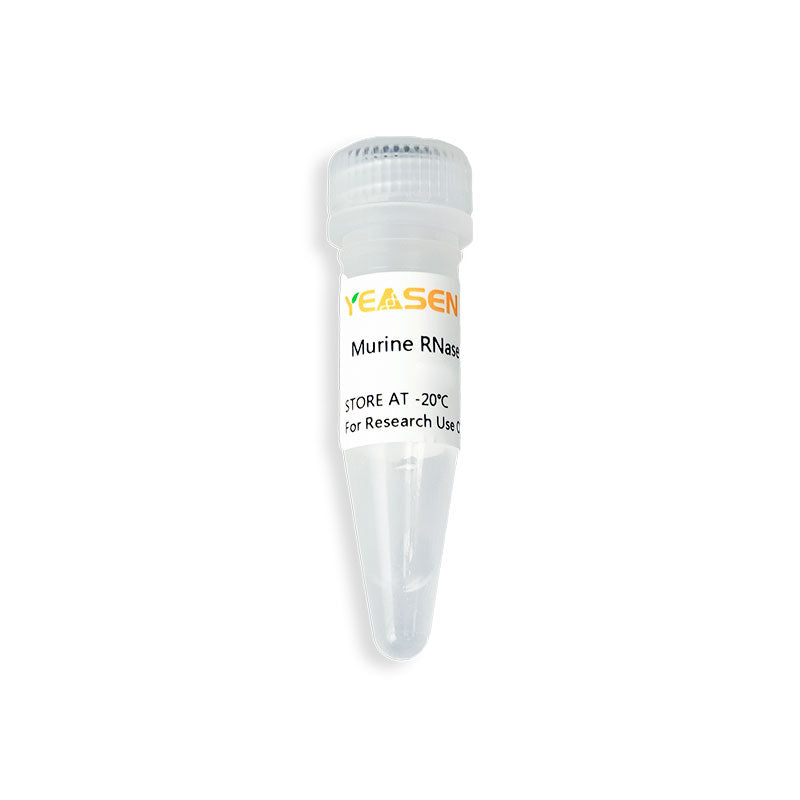Description
RNase Inhibitor is a specific ribonuclease (RNase) inhibitor found in human placenta. The principle of its specific inactivation of RNase is to bind non-covalently with RNase to form a complex, causing RNase to become inactive.
This product is a recombinant mouse RNase inhibitor expressed and purified in a soluble form in E. coli, capable of broadly inhibiting various types of RNases (RNase A, B, C). Tested with RT-PCR and RT-qPCR, this product is compatible with Hifair® III Reverse Transcriptase (Cat#11111ES) and various DNA Polymerases. Compared to human RNase inhibitors, this product lacks two cysteine residues that are highly sensitive to oxidation in human proteins, thus possessing greater antioxidant activity. Additionally, it is more suitable for experiments with high sensitivity to DTT, such as qPCR.
This product can be used in experiments such as first-strand cDNA synthesis, separation of polyribosomes, in vitro transcription, and in vitro cell-free translation systems.
Features
1.Broad-spectrum RNase inhibitory activity: Capable of inhibiting RNases including RNase A, RNase B, RNase C, and others.
2.Compatible with a wide range of reaction conditions: Active under pH conditions from 5.0 to 9.0 and temperatures from 25°C to 60°C, suitable for thermophilic reverse transcriptases (55°C-60°C).
3.Compatible with a broad spectrum of downstream experiments: No impact on the enzymatic activity of SP6, T7, or T3 RNA polymerases, AMV, M-MLV reverse transcriptases, and Taq DNA polymerases.
4.Scalable production: Single-batch production capacity reaches 2 billion units, ensuring product uniformity, stability, and timely supply.
5.Batch-to-batch stability: Mature protein expression and purification platform, compliant with the ISO 13485 quality management system, quality control testing is conducted according to quality standards to ensure the stability of products between batches.
01 No exonuclease, incision enzyme residue

Figure: Detection of MRI nuclease (in a 20 μl reaction system, 200 U of MRI and 0.5 μg of λDNA-HindⅢ digest were added, incubated at 37°C for 4 hours) and nicking enzyme residual activity (in a 20 μl reaction system, 200 U of this enzyme and 0.5 μg of plasmid DNA were added, incubated at 37°C for 4 hours) shows no residual activity. Note: N represents the negative control; 1, 2, 3 represent three different batches.
02 No RNase enzyme residue

Figure: 20 μl reaction system added 200 U MRI and 0.5 μg 293T RNA, incubated at 37℃ for 4 hours, agarose gel electrophoresis RNA band did not change, there was no RNase residue.
Note: N stands for negative control; 1, 2, and 3 are batches.
03 RNase enzyme inhibition ability comparable to competing brands

Figure: Using the influenza A virus culture supernatant as a template, the RT-qPCR reaction was performed using the Hifair® V Multiplex One Step RT-qPCR Probe Kit (UDG Plus) (Cat#13650ES) to validate the RNaseA digestion capability of MRI. The results indicated that Yeasen MRI's inhibitory capacity against RNaseA is comparable to that of similar international competitive products.
Note: Yeasen Control represents 8 U MRI + 0 ng RNaseA; Yeasen represents 8 U MRI + 60 ng RNaseA; R* Control represents 8 U of a similar competitive product + 0 ng RNaseA; R* represents 8 U of a similar competitive product + 60 ng RNaseA.
Note: For more other concentrations, please consult the local salesman.
Documents:
Citations & References:
[1] Qiu J, Fan Q, Xu S, et al. A fluorinated peptide with high serum- and lipid-tolerence for the delivery of siRNA drugs to treat obesity and metabolic dysfunction. Biomaterials. 2022;285:121541. doi:10.1016/j.biomaterials.2022.121541(IF:12.479)
[2] Song Y, Guo Y, Li X, et al. RBM39 Alters Phosphorylation of c-Jun and Binds to Viral RNA to Promote PRRSV Proliferation. Front Immunol. 2021;12:664417. Published 2021 May 17. doi:10.3389/fimmu.2021.664417(IF:7.561)
Related Blog:
Payment & Security
Your payment information is processed securely. We do not store credit card details nor have access to your credit card information.
Inquiry
You may also like
FAQ
The product is for research purposes only and is not intended for therapeutic or diagnostic use in humans or animals. Products and content are protected by patents, trademarks, and copyrights owned by Yeasen Biotechnology. Trademark symbols indicate the country of origin, not necessarily registration in all regions.
Certain applications may require additional third-party intellectual property rights.
Yeasen is dedicated to ethical science, believing our research should address critical questions while ensuring safety and ethical standards.

